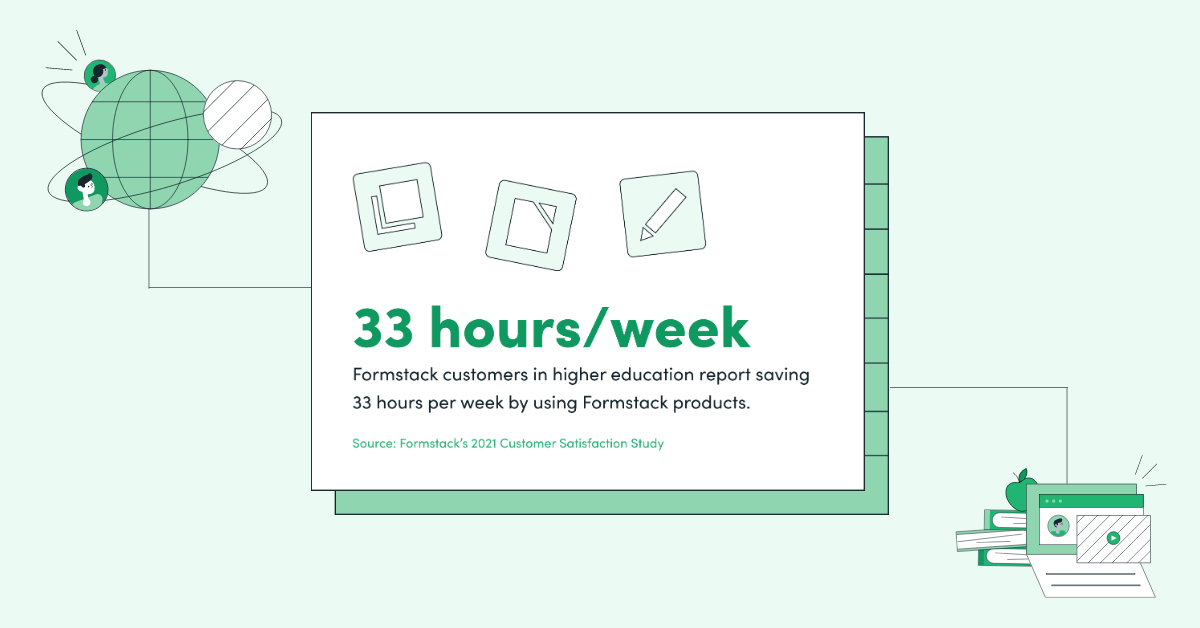Digital processes have never played a more important role in higher education than they do today. After navigating a tough year of virtual learning due to the pandemic, higher education institutions have learned in-person interactions and manual processes aren’t always reliable. And when time is of the essence, waiting on IT to get through their queue just isn’t feasible.
That’s where no-code technology shines.
But providing a great student, staff, and alumni experience is critical no matter what the climate is. As school choices become more competitive and students seek out digital-first experiences, investing in no-code tools at your school or university can enable workers of all technical levels to achieve great results with less time, money, resources, and infrastructure.
No-Code 101
Are you a no-code freshman? No-code technology is a type of software development that allows anyone to create digital applications without writing a single line of code. That’s right—no. code. Instead, it relies on tools with an intuitive drag-and-drop interface to create a unique solution to a problem. The resulting solution might include building mobile, voice, or ecommerce apps and websites or automating any number of tasks or processes like:
- Payment systems
- Registration processes
- Scholarship workflows
- Paperless financial aid applications
- Donor portals
Whatever it is, no-code allows you to do it all on your own. But perhaps even better than the final outcome you create, no-code technology allows you to simplify your work with four key benefits:
- Minimize IT reliance. No more waiting. With no-code, employees of all technical skill levels can quickly do it on their own.
- Accelerate project timelines. Move at your own speed. Whether you’re automating document creation or streamlining how you collect and store data, no-code tools help you go from idea to solution at lightning speed.
- Simplify cross-departmental processes. Rely on one tool alone. From admissions to alumni relations, all data can be stored in one place, easily shared, and quickly processed with automated education workflows.
- Control workflows from start to finish. You call the shots. No need for long approvals or waiting on other teams to get your project off the ground.
A By-the-Book Example for Higher Ed
The sky’s the limit for higher education no-code use cases. But perhaps one of the most common examples is setting up education workflows for student enrollment, financial aid, and scholarships. Offering a seamless student application experience is crucial to converting prospective students into active ones—and paper processes or complicated systems just won’t cut it. Simplify the process by offering a completely digital, mobile-friendly workflow. Here’s how:
Products: Forms · Documents · Sign
Features: Workflows · Portals · File Uploads · WCAG & Section 508 Compliance
Templates: Scholarship Application · College Application · Certificate
Optional Integrations: Dropbox · Trello · Google Cloud Print
Pro tip: Add Save and Resume functionality to your form to allow students to build their application over time.
Trust us—your admissions team will love how simple, easy, and efficient this workflow is to build, manage, and edit. Already, Formstack users in higher education say they save an average of 33 hours per week by using no-code products. What do you stand to gain?

Want more examples of automation in education? Check out our latest Guide to No-Code Workflow in Higher Education for a deep dive into the templates and resources you can start using today to take control of your higher education workflows.











